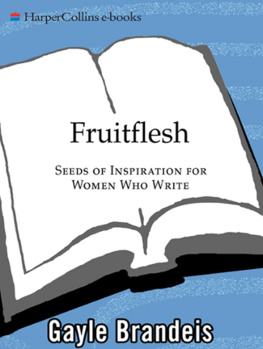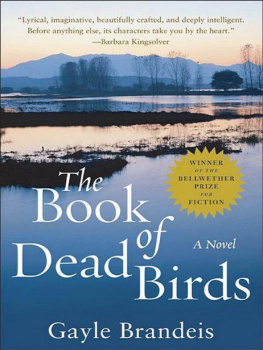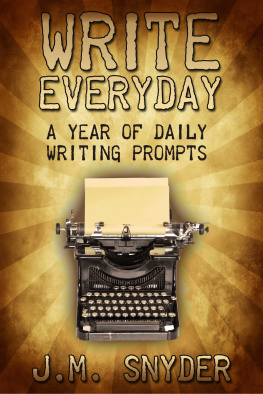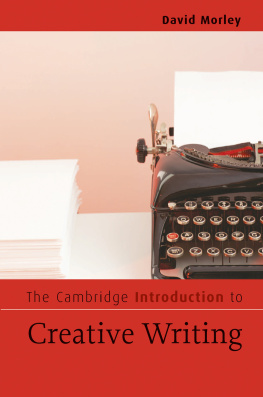Gayle Brandeis - Fruitflesh: Seeds of Inspiration for Women Who Write
Here you can read online Gayle Brandeis - Fruitflesh: Seeds of Inspiration for Women Who Write full text of the book (entire story) in english for free. Download pdf and epub, get meaning, cover and reviews about this ebook. year: 2009, publisher: HarperCollins, genre: Romance novel. Description of the work, (preface) as well as reviews are available. Best literature library LitArk.com created for fans of good reading and offers a wide selection of genres:
Romance novel
Science fiction
Adventure
Detective
Science
History
Home and family
Prose
Art
Politics
Computer
Non-fiction
Religion
Business
Children
Humor
Choose a favorite category and find really read worthwhile books. Enjoy immersion in the world of imagination, feel the emotions of the characters or learn something new for yourself, make an fascinating discovery.
- Book:Fruitflesh: Seeds of Inspiration for Women Who Write
- Author:
- Publisher:HarperCollins
- Genre:
- Year:2009
- Rating:5 / 5
- Favourites:Add to favourites
- Your mark:
- 100
- 1
- 2
- 3
- 4
- 5
Fruitflesh: Seeds of Inspiration for Women Who Write: summary, description and annotation
We offer to read an annotation, description, summary or preface (depends on what the author of the book "Fruitflesh: Seeds of Inspiration for Women Who Write" wrote himself). If you haven't found the necessary information about the book — write in the comments, we will try to find it.
Get Your Creative Juices Flowing
A sumptuous, sensuous writing guide from the author of the award-winning The Book of Dead Birds
Fruitflesh: Seeds of Inspiration for Women Who Write — read online for free the complete book (whole text) full work
Below is the text of the book, divided by pages. System saving the place of the last page read, allows you to conveniently read the book "Fruitflesh: Seeds of Inspiration for Women Who Write" online for free, without having to search again every time where you left off. Put a bookmark, and you can go to the page where you finished reading at any time.
Font size:
Interval:
Bookmark:

Seeds of Inspiration for Women Who Write

For my parents, who gave me this body
For my children, who came through this body
For my husband, who makes me grateful
to live in this body every day
Write your self, your body must be heard.
H LNE C IXOUS
If a woman wants to be a poet, she must dwell in the house of the tomato.
E RICA J ONG
The impetuous seed of creation does not exactly come forth on little cat feet.
G EORGIANNE C OWAN ,
from The Sacred Womb
Where otherwise words were, flow discoveries, freed all surprised out of the fruits flesh.
R AINER M ARIA R ILKE
A strawberry changed my life.
It was my senior year of high school. At the time, I lived in, lived for, the heady world of ideals. Truth. Justice. Beauty. Spirit. Capital-I Ideals, which seemedblessedly, I thoughtto transcend the body. I was not very comfortable in my own skin as a teenager and found the body altogether too messy, too unpredictable, too fraught with humiliation and pain for my taste. I strove for something higher than what I perceived to be the illusion of the senses, the crudeness of physicality. Books were my escape, writing my refuge. At the time, I believed language was removed from the body; words, to me, were pure spirit, pure, crystalline thought. I lived in a thin, rarefied air. I cut myself off from all sensations below my chin. I cut myself off from the world around me.
Then a strawberry woke me up.
My favorite class at the time was philosophy. The teacher, Ms. Sweers, came into the classroom that day and dropped a crate of berries onto her desk. The fruit quivered lush and red inside the box. A sweet, loamy fragrance filled the air. Despite my minds attempt to stay on top of my salivary glands, my mouth began to water.
Ms. Sweers walked around the classroom and placed a berry on each students desk. The fruit glowed in front of us like little lanterns.
Dont start eating yet, Ms. Sweers cautioned, to the frustrated moans of the class.
She sat back down at her desk and put a single berry on her palm.
I want you each to fully experience your berry, she said. Take five minutes to explore it with all of your senses but taste. Look at it closely. Breathe in its smell. Notice every texture, every nook and cranny. Give this berry the respect, the attention, it deserves. You may begin.
I picked up my strawberry, not expecting much. I had eaten countless berries in my life, after all. What was so special about this one? I loved Ms. Sweers, though, and was willing to go along with whatever she had in mind. I was sure there was some lesson to follow, some esoteric wisdom to be imparted after the frivolous exercise. I didnt realize the strawberry itself, the experience itself, would become the teacher.
Quickly, I discovered that I had never really looked at a strawberry before, not up close. As I carefully examined the nubbin of fruit, I wondered if I had ever looked, truly looked, at anything before. The scales, as they say, began to fall from my eyes. Everything seemed magnified. The strawberry became infinitely fascinatingits satiny skin, its intricate pattern of seed, its shaggy crown of delicately veined leaves. Was the whole world this richly complex? How much else had escaped my attention? I lifted the berry to my nose and breathed the scent deep into my lungs. My fingertips tingled against the edges of the leaves, thrilled with each curve of berry flesh. My senses emerged from their coma and sang.
I was startled by the intensity of my response to the fruit. When the five minutes were up and it was time to eat, I felt torn. I didnt want to put the berry in my mouthI didnt want to say good-bye to its precious, singular body. At the same time, I wanted the berry inside me. I wanted to merge with it, draw it deep into my cells. I wanted to feel it coursing through my blood.
Ms. Sweers told us to take another five minutes to eat the fruit. Eat with mindfulness, she told us. Be aware of every texture against your lips, your tongue, the roof of your mouth. Be aware of each nuance of taste, each shadow of sour and sweet.
I rolled part of the berry around on my tongue. The sensations inside my mouth were so exquisite they almost hurt. As bits of fruit slid luxuriantly down my throat, I knew I had never felt so alive before in my life.
After those five minutes were up, Ms. Sweers asked us to write a haiku about our time with the strawberry. I wasnt sure I could do it. How could I distill such a monumental experience into a mere seventeen syllables? How could I capture the voluptuousness of the moment with such slender letters? My whole body hummed, as if the berry had filled me with its own vibrant red energy. I picked up my pen.
I dont remember the entire haiku I wrote that day, only the last line: A small heart beats in my mouth. When it was my turn to read my poem out loud, some of the kids in the class said, Ewwww, but I didnt mean anything gross by those words. I just wanted to acknowledge the berrys aliveness. I wanted to acknowledge the way it brought me to life.
My writing changed irrevocably that day. Most of my high school poetry until then had been impassioned but unembodied rants against consumerism and the vague injustices of society. After the strawberry, my writing became much more lush, more connected to the environment, to my body.
I discovered that the capital-I Ideals I loved to write about were all the more palpable when I rooted them in the real world. Love is the meaning of life is a nice sentiment, but I began to realize it wouldnt hit home the way an image of a woman lifting a wedge of orange to her dying husbands mouth would.
I also discovered I didnt always have to write about the big issues to give my work power. I began to see it as my task to bear witness to the moment, to give voice to the incredible world around and inside me. I knew that if I could learn to pay deep attention to life, the way I had with the strawberry, I could begin to heal my relationship with my own flesh, my own creativity. I could tap into the pain and shame of my body and release it with words. I could explore my senses, my pleasures, and release them, tooboth in my body and on the page. When I wrote about the fuzzy, feverish feeling on the first day of my period or the way the light spilled across the kitchen table, I could let the world speak, in all its wonderful, terrible beauty, through my fingertips, my tongue.
My experience of my body, of myself as a woman, forever changed that day in philosophy class. As I swallowed the plush fruit, I began to sense the fruitfulness, the sweet wildness, that lived inside my own skin. I began to want to unleash it.
That strawberry launched me on my lifes path. It has been my quest ever since to unite body and word, language and flesh. In the process, I discovered I wanted to help other women writers tap into the vast, luscious creativity that simmers inside all our bodies. Fruitflesh is born of that desire. The pages are still dripping with strawberry juice.
Call it a fruit. Call it the bodys language, Renascent itch that says I am alive.
R ACHEL H ADAS, from Pomegranate Variations
Our bodies are fruit. Our bodies are luscious, ripe, full of slick seeds.
Font size:
Interval:
Bookmark:
Similar books «Fruitflesh: Seeds of Inspiration for Women Who Write»
Look at similar books to Fruitflesh: Seeds of Inspiration for Women Who Write. We have selected literature similar in name and meaning in the hope of providing readers with more options to find new, interesting, not yet read works.
Discussion, reviews of the book Fruitflesh: Seeds of Inspiration for Women Who Write and just readers' own opinions. Leave your comments, write what you think about the work, its meaning or the main characters. Specify what exactly you liked and what you didn't like, and why you think so.







